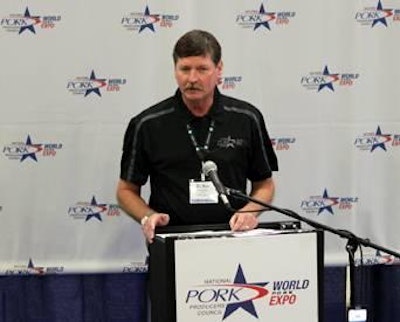
The Food and Drug Administration’s (FDA) Veterinary Feed Directive (VFD) final rule took centerstage at the National Pork Producers Council’s (NPPC) opening press conference at the 2015 World Pork Expo.
The final rule, announced June 2, provides the framework to promote the judicious use of antimicrobials in food-producing animals by eliminating the use of medically important antibiotics for growth promotion and bringing therapeutic treatment under veterinary oversight.
According to NPPC president Dr. Ron Prestage, the swine industry fully embraces the change.
“We recognize the need to protect the availability of medically important antibiotics for animal and human medicine,” says Dr. Ron Prestage, NPPC president, who notes the organization’s 16-year push to reduce antibiotic use in pork production. “I’ve said it before and I’ll say it again: Those of us working in agriculture will never win nor would it be prudent to point the finger at our human counterparts’ positions in an effort to defend our use of antibiotics.”
Under the VFD final rule, antibiotics that formerly held over-the-counter status will now require a veterinarian’s prescription before they can be used in animal feed and water. This action adds an additional 283 drugs to the VFD list. In addition, it will require additional veterinarian oversight and accountability as defined by the veterinarian-client-patient relationship (VCPR) criteria. The final rule will be implemented by the end of 2016.
Animal health remains a priority
Prestage points to yesterday’s “White House Forum on Antibiotic Stewardship," a gathering of more than 100 animal and health stakeholders hosted by the Obama administration, aimed at cooperatively tackling the global issue of antimicrobial resistance.
“No one questioned that as ethical caretakers of animals we have a moral obligation to treat animals if they’re sick,” Prestage reports. “The good news is they all recognized that we need to treat animals if they become ill.”
He stresses that antimicrobial resistance is the “big issue” and wants pork industry customers to understand that safeguards are in place to ensure responsible antibiotic use in pig farming.
NPPC promotes responsible antibiotic
The NPPC notes that the organizations efforts to curb the overuse of antibiotics began in 1999 with Pork Quality Assurance (PQA) Plus, a management education program run by Pork Checkoff “that emphasizes good management practices in the handling and use of animal health products, and encourages producers to review their approach to their herd’s health problems.”
The three-prong program focuses animal health, animal welfare and environmental stewardship.
“Within animal health, we focus on the appropriate and judicious use of antibiotics and that there needs to be an appropriate VCPR in order to make the appropriate decisions involving antibiotics,” says Prestage. “It’s not the result of recent attention to antibiotics in food animals, this has been evolving for the last 16 years within the leadership of NPPC.”
The World Pork Expo will be held in Des Moines, IA, June 3-5, 2015.
For more information, visit www.pork.org.

















